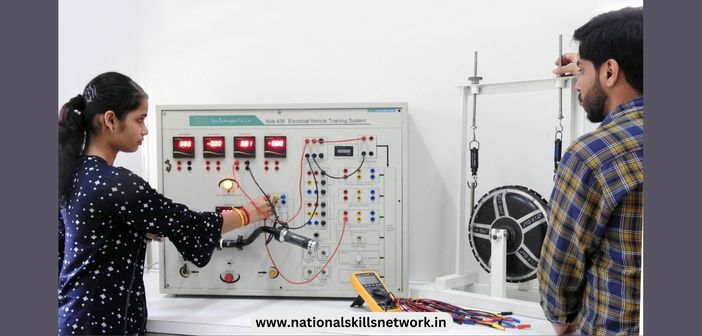
The Electric Vehicle (EV) industry is experiencing rapid growth and transformation, fueled by global efforts to reduce greenhouse gas emissions and combat climate change. As the world transitions to cleaner transportation solutions, the need for skilled manpower in the EV sector becomes increasingly evident. In this article, we will explore the top three reasons why focusing on demand-driven skilling in EV is imperative and discuss how the curriculum and practical training must be modernized to meet industry needs.
Guest author – Nikhil Kela, Business Development Manager, Scientech Technologies Pvt. Ltd.
Top 3 reasons to prioritize demand-driven skilling for Electric Vehicles
Fostering industry growth through a future-ready workforce
The growth of the EV industry is heavily reliant on the availability of skilled human resources. As we are aware, the current situation in skilling for EVs lags behind other emerging technologies, such as drones. To meet the ambitious goals of the Government of India (GOI) to mainstream EVs and reduce dependence on oil for transportation, there is an urgent need to bridge this skill gap.
Various established automotive companies, including Mahindra, TATA, MG Motors, BYD, Hyundai, Mercedes, BMW, and Volvo, have already ventured into manufacturing EVs. Furthermore, a burgeoning startup ecosystem, along with medium-sized companies, is entering the two and three-wheeler EV segment. Electric buses are also being manufactured by multiple companies. This influx of EV-related businesses indicates a growing demand for skilled individuals in various segments of the EV industry, including manufacturing, R&D, and service.
Empowering innovation in the EV sector with a skilled workforce
While we acknowledge that a curriculum related to Electric Vehicles (EVs) has received approval from the Directorate General of Training (DGT), it is essential to focus on the positive path forward. It’s worth noting that 80% of the current curriculum’s content pertains to Internal Combustion Engines (ICE). However, recognizing the differences between EV technology and ICE technology is the first step toward meaningful progress.
Understanding that EVs operate on fundamentally distinct principles, from drive systems to battery management and power electronics, highlights the necessity of a dedicated curriculum tailored to the intricacies of Electric Vehicle technology. This dedicated curriculum is not just a need; it’s an exciting opportunity to shape a workforce that is well-versed in the cutting-edge advancements of the EV industry.
To ensure that future EV professionals are adequately prepared, institutions must update their course materials to reflect the latest advancements in EV technology. Topics should encompass battery technology, electric drive systems, charging infrastructure, and sustainable energy integration. This will not only produce knowledgeable graduates but also empower them to drive innovation in the EV sector.

Positioning India as the global leader in EV technology
The EV industry presents a plethora of opportunities beyond vehicle manufacturing. Ancillary industries, such as battery manufacturing, power electronics, and charging infrastructure, are thriving and require skilled professionals. Additionally, the service sector demands skilled manpower for installing and maintaining EV chargers in public places. As the adoption of EVs increases, thousands of chargers are yet to be deployed, providing ample job prospects in this sector.
Furthermore, allied sectors like battery swapping, solar charging, and independent service stations also rely on skilled EV technicians. By investing in demand-driven skilling for EVs, India can position itself as a global manufacturing hub for EVs, similar to the success seen in the smartphone industry. The potential for economic growth and job creation in the EV sector is substantial, making it a strategic focus area for skill development.
Bridging the skill gap in the EV industry
To address the pressing need for a skilled workforce in the Electric Vehicle (EV) industry, innovative solutions are imperative. A standout approach is the establishment of Electric Vehicle (EV) labs within educational institutions, ranging from prestigious universities to colleges and technical schools.
These EV labs play a pivotal role in bridging the skills gap by providing students with hands-on experience in the realm of Electric Vehicle technology. Here, they gain invaluable insights into the design, construction, and maintenance of EVs, preparing them for the demands of this rapidly evolving industry. Moreover, these labs are not just about technical know-how; they also serve as platforms for educating students about the far-reaching environmental and economic benefits of EVs, promoting a culture of awareness and sustainability.
Nvis Technologies Pvt. Ltd. has emerged as a pioneering force in this endeavour, specializing in the development of cutting-edge lab training solutions tailored to the education sector. Their extensive product portfolio encompasses a wide array of offerings, including Electric Vehicle Training Systems, Battery Characteristics and Management Training Systems, BLDC (Brushless DC) Motor Training systems, SRM training systems, CAN bus training systems, EMC training systems
PMDC Machine Labs, Regenerative Charging and Braking Training Systems, and much more. By combining these innovative labs with comprehensive educational resources, we can empower the next generation of professionals who will drive the future of electric mobility, making it more sustainable and accessible for all.
Also read: 3 Ways to integrate multidisciplinary skills in drone training
The shift towards Electric Vehicles is not just an environmental necessity; it’s a global economic opportunity. To ensure India’s active participation and competitiveness in the burgeoning EV industry, there is an urgent need to prioritize demand-driven skilling. By modernizing the curriculum and providing hands-on training opportunities, educational institutions can play a pivotal role in producing a skilled workforce that can drive the Electric Vehicle revolution. As the world races towards a sustainable future, it is imperative that India leads the way in the EV sector through a well-prepared and future-ready workforce.












